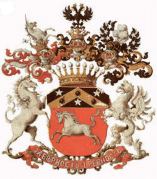Shuvalov

Coat of arms of the Shuvalov family
.jpg)
Portrait of Countess Catherine P. Shuvalova, 1770s, by Greuze.
Shuvalov (Russian: Шува́лов) is the name of a Russian noble family which, although documented since the 16th century, rose to distinction during the reign of Empress Elizabeth and was elevated to the rank of counts on 5 September 1746.
Members of the Shuvalov noble family
The notable Shuvalovs include:
- Ivan Ivanovich Shuvalov (1727–1797), lover of Empress Elizabeth and Maecenas of the Russian Enlightenment, who declined a comital title offered to him by the sovereign;
- Count Alexander Ivanovich Shuvalov (1710–1771), his first cousin, Field Marshal and head of the secret police;
- Count Peter Ivanovich Shuvalov (1711–1762), the latter's brother, Field Marshal and Minister of War, one of the most influential policy-makers during Elizabeth's reign;
- Count Andrey Petrovich Shuvalov (1743–1789), the latter's son, spent most of his life abroad, conversing with Voltaire and writing libertarian verses in French; the 1911 Encyclopaedia Britannica names him as the true author of Catherine II's celebrated letters to the French Encyclopedists;
- Count Peter Andreyevich Shuvalov (1827–1889), the latter's grandson, who wielded great influence at the court of Alexander II of Russia;
- Count Pavel Andreyevich Shuvalov (1776–1823), Russian general during Patriotic War 1812;
- Count Pavel Andreyevich Shuvalov (1830–1908), the latter's brother, who represented Russia at the Congress of Berlin and at the German court;
- Count Pavel Pavlovich Shuvalov (1859–1905), the latter's son, who headed the Moscow police before his assassination by revolutionaries in 1905;
- Count Mikhail Andreyevich Shuvalov (1850–1903), inherited the title of Prince Vorontsov from his maternal grandfather, but died without issue.
Other people with the Shuvalov name
- Igor Shuvalov (born 1967) - First Deputy Prime Minister of Russia
Palaces
.jpg)
Shuvalov-Naryshkin Palace (1850s).
The Shuvalov seats included four residences in Saint Petersburg:
- the Baroque palace of Ivan Shuvalov on Italianskaya Street, constructed in 1749-55 to a design by Savva Chevakinsky, later sold to the Ministry of Justice, best known as the place where the Imperial Academy of Arts started to operate;
- the Neoclassical palace of Peter Ivanovich Shuvalov (the Moika Palace), later sold to the House of Yusupov, who decorated it with shameless opulence, best known as the place where Rasputin was killed (, , , );
- another Neoclassical palace (located on the Fontanka embankment), inherited by Pavel Petrovich Shuvalov from the Naryshkin family in 1900, which is now the location of the Fabergé Museum (illustrated, to the right);
- the manor of Pargolovo near St. Petersburg.
They also inherited the possessions and castles of the ducal Biron family in Courland, such as the Rundale Palace.
External links
| Wikimedia Commons has media related to House of Shuvalov. |
- (English) Marek, Miroslav. "Shuvalov family tree". Genealogy.EU..
- (German) Genealogisches Handbuch der baltischen Ritterschaften Teil 2,3: Estland, Görlitz 1930
- Information about Shuvalov Palace - Fabergé Museum website